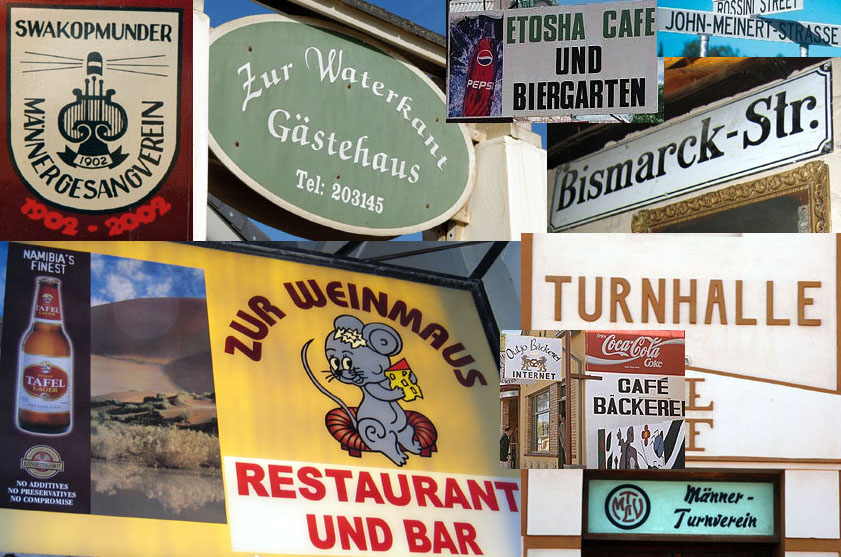Antwort Does Namibia still speak German? Weitere Antworten – Do people still speak German in Namibia

Namibia is a multilingual country in which German is recognised as a national language. While English has been the sole official language of the country since 1990, in many areas of the country, German enjoys official status at a community level.In 1990, the former colony became independent as Namibia, governed by the former liberation movement SWAPO.Languages most often spoken in Namibian households are:
- Oshiwambo – also known as Ovambo (48.9% of households)
- Khoekhoegowab – also known as Khoekhoe (11.3%)
- Afrikaans – (10.4%)
- Otjiherero – also known as Herero (8.6%)
- RuKwangali – also known as Kwangali (8.5%)
- siLozi – also known as Lozi (4.8%)
- English – (3.4%)
Is Namibia German or Dutch : Early in the 20th Century Namibia was a German Colony. After the 1st World War it became a League of Nations administered territory. Following the 2nd World War, South Africa administered Namibia, until independence in 1990. Namibia has passed through several distinct stages over the years.
Do any African nations speak German
20,000 German Namibians, who speak German as their mother tongue, live in Namibia in southwest Africa. They are descendants of German colonists (the colony of German Southwest Africa existed from 1884 to 1915).
What are the top 3 languages spoken in Germany : Percentage of people in Germany who speak the languages below as a mother tongue or foreign language.
- German 94.17%
- English 31.93%
- French 8.81%
- Russian 7.64%
- Turkish 2.67%
- Polish 2.6%
- Spanish 2.5%
- Italian 2.19%
Germans are 2% of Namibian population and STILL own 70% of the Namibian land!

July 1915: Germany loses control of South West Africa to Allied and South African troops. 1919: After Germany's defeat in the First World War, the Treaty of Versailles forces it to give up its colonies. 1923: Chief Samuel Maharero dies in exile in present-day Botswana.
Was Namibia a German colony
The history of Namibia has passed through several distinct stages from being colonised in the late nineteenth century to Namibia's independence on 21 March 1990. From 1884, Namibia was a German colony: German South West Africa.As the result of German colonial rule (1884–1915), South African occupation (1915/1921–1990), and the introduction of English as the sole official language with independence in 1990, three West Germanic languages are spoken alongside the local languages of the country, i.e. German, Afrikaans, and English.Outside of Europe, there are many other countries where German is spoken, such as Kazakhstan, Namibia, and South Africa. There are other parts of the world where German is also spoken by a small percentage of the population.

Can you live in Germany without knowing German It is just about possible to live in Germany without knowing much German. But in order to find employment and to fully integrate into society, you will need to be able to speak and read German to a good standard, especially if you live outside the major cities.
What is the closest language to German : Dutch
It is most closely related to other West Germanic languages, namely Afrikaans, Dutch, English, the Frisian languages, Scots. It also contains close similarities in vocabulary to some languages in the North Germanic group, such as Danish, Norwegian, and Swedish.
Is it safe to go to Namibia : Country Summary: Petty crime, such as pickpocketing, purse snatching, and "smash-and-grab" attacks on vehicles, is increasingly common, and these can violently escalate into robberies and muggings. There is a higher risk of crime in the central business districts of major cities after dark.
How much does Germany owe Namibia
1.1 billion euros
The scheme would see Namibia get 1.1 billion euros ($1.2bn) in “development aid”, with 50 million euros ($54m) set aside for research, remembrance and reconciliation projects, with the rest marked for the development of affected descendants' communities.

Germany agreed in May 2021—when it officially recognized the Herero-Nama genocide for the first time—to fund 1.1 billion euros ($1.2 billion) worth of Namibian projects. The money was to be disbursed into existing aid programs over 30 years.The reason Germany selected Namibia as its “protectorate” was influenced by the fact that a tobacco merchant from Bremen, Franz Luderitz, bought up coastal land in the area in 1882. This resulted in Germany actively establishing itself in the African country by 1884.
What did Germany call Namibia : German South West Africa, a former German colony (1884–1919) that is now the nation of Namibia, in southwestern Africa. In 1883 Franz Adolf Lüderitz, a merchant from Bremen, Germany, established a trading post in southwest Africa at Angra Pequena, which he renamed Lüderitzbucht.

![csm_2405-bauerfeind-produktkategoriesseiten-bandagen-ellenbogenbandage-2560x1400_88-1_f91f66009c[1]](https://www.nakajimamegumi.com/wp-content/uploads/2024/06/csm_2405-bauerfeind-produktkategoriesseiten-bandagen-ellenbogenbandage-2560x1400_88-1_f91f66009c1-1024x521-65x65.jpg)
![Ischiasschmerzen[1]](https://www.nakajimamegumi.com/wp-content/uploads/2024/06/Ischiasschmerzen1-1024x640-65x65.jpg)
![csm_blogbeitrag_autoimmunerkrankung_d307ac8b72[1]](https://www.nakajimamegumi.com/wp-content/uploads/2024/06/csm_blogbeitrag_autoimmunerkrankung_d307ac8b721-1024x576-65x65.jpeg)